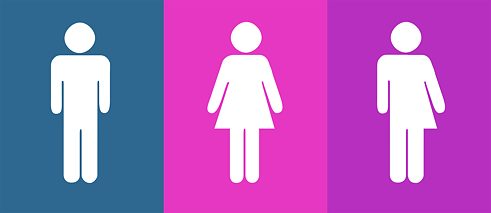Intersex
Gender diversity

At the beginning of 2019, population registers in Germany were amended to include a third gender category. The option box is headed ‘divers’, which translates as ‘miscellaneous’ or ‘other’, and it was introduced for a dual purpose: to remove the burden from parents faced with deciding an intersex child’s future and to show that being different can also be normal.
In the changing room at a gym, at a public lavatory or in a sauna – there are lots of situations in everyday life where we need to decide between rooms for women and men. Most of us don’t give the matter a moment’s thought but for some people it is not a simple choice – it is painfully embarrassing.
There are people whose gender cannot be clearly defined as male or female. Intersex anatomy can take a whole range of forms. One person may be born with testicles as well as ovarian tissue and produce both male and female hormones. Another may be born with mosaic genetics, where some cells have XX (female) chromosomes and others have XY (male). And yet another person may have cell receptors that fail to respond to sex hormones or genitals that do not develop fully.
There are no precise figures for the number of people with intersex variations in Germany. Estimates by self-help groups put the total at around 160,000. In January 2019, legislation came into force creating a new gender category for population registers. Apart from boxes for female and male – and the option of not ticking either of them – there is now a box marked ‘divers’. Why is it necessary?
No blank space any more in a birth certificate
In 1981, the Transsexual Act in Germany made it possible for people to change their gender assignment in population registers. Since 2013, there has also been the option of leaving the gender box on a birth certificate blank. But in autumn 2017 the Federal Constitutional Court ruled that a binary gender choice discriminates against persons who cannot identify as either male or female and contravenes the general right of personality. The judges found that leaving the field blank was not an equivalent option – an additional, positive alternative needed to be available. At the end of 2018, the German Bundestag voted for the register of births to be amended to include the gender category ‘divers’. The legal text states that the category is intended for “people who cannot be classified as female or male because of a variation of sexual development”. This applies not only to newborns but also to intersex adults, who can request that their registered gender and first names should be changed retrospectively. They generally need a medical certificate to do so, although in exceptional cases an affidavit can suffice.
But the new law is also intended to help parents. Where a baby is born with intersex features, parents are required to make decisions that can have far-reaching consequences for the child. In the 1970s, there was a widespread acceptance in the medical profession that so-called gender reassignment surgery was advisable even for minors. The argument was that the cosmetic construction of unambiguous genitals would spare intersex children feelings of shame and humiliation. Procedures include construction of an artificial vulva, amputation of the clitoris or removal of gonads, the organs that produce sex hormones. In the 2000s there was a rethink, amid a new awareness that sexuality is not solely dependent on genitalia. In 2007, the German Society of Paediatrics and Adolescent Medicine disassociated itself from the practice of gender reassignment surgery and since 2012 the German Ethics Council has urged caution. The UN Committee against Torture even calls for the complete prohibition of cosmetic genital surgery on minors – because being intersex does not generally stop a child being healthy.
Can surgery make a healthy child happier?
Intersex organisations and self-help groups for people who underwent genitoplastic procedures during childhood describe the surgery as highly traumatic. In many cases, patients were left sterile and barely able to have a sex life. Campaign groups argue that the decision to embrace a particular gender or opt for surgery must be a personal one. Nevertheless, many doctors continue to recommend these procedures: the number of operations performed – more than 2,000 children under 10 underwent genitoplastic surgery in 2016 – remains fairly constant.
There is only one country in Europe where it is a criminal offence to perform gender reassignment surgery on minors: Malta. But even Germany’s new legislation is comparatively progressive. Not many countries worldwide have birth registers that offer a third gender option. So far the list includes only Australia, New Zealand, Argentina, India, Pakistan, Bangladesh and Nepal. But legislation is just the start: statutory recognition of a non-binary gender category will raise further legal issues – from rules on team sports to quotas for women.
The important thing is what follows recognition of the ‘divers’ gender category: the new law is a bureaucratic attempt to raise awareness of gender diversity – and show that even different is normal.